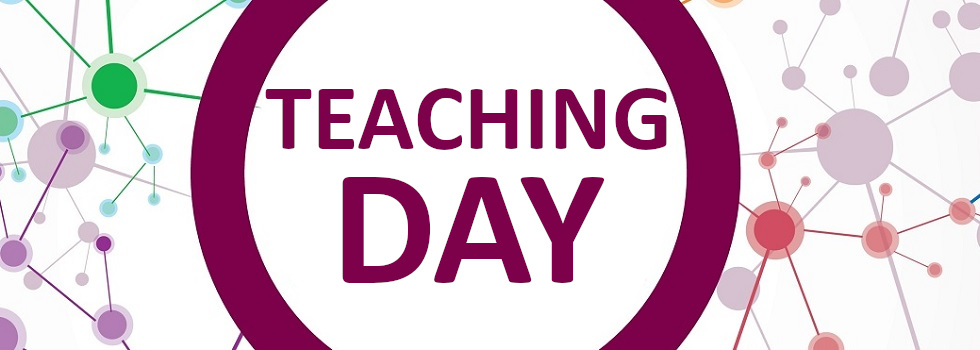Teaching Day 2025
Date: 11.06.2025 | from 13:00 Uhr - Teaching free (Dies academicus)
Decentralised programme in the faculties
Faculty of Medicine
Teaching and learning together at the Faculty of Medicine
| Place & Time: MAMBA Skillslab - Building 97 | 1:00 p.m. - 4:00 p.m. | |
|
Offers with mandatory pre-registration until 31.05.2025: HERE
|
Digital learning in medical studies? - Yes, but in a way that suits me!
Design Thinking Workshop - Learning Heroes 2.0
| Lecturer: Theresa Franke-Frysch |
| Place & Time: MAMBA Skillslab Building 97 | 1:30 p.m. - 5:30 p.m. |
| The programme is aimed exclusively at medical students. Further information and binding registration can be found at: Bearbeitung von Kurs: Design Thinking Workshop am Tag der Lehre - Lernheld*innen 2.0 | E-Learning Portal der UMMD |
Faculty for Human Sciences
Degrees of freedom of CP allocation
| Lecturers: Dr. Julia Hille, Dr. Jens Holze & Office of the Dean of Studies FHW | |
|
Place & Time: G40B - 125 | 1:00 p.m. - 3:00 p.m. |
|
|
|
Faculty of Electrial Engineering and Informational Technology
Guidelines on the use of AI tools, chatbots and language models in studies & teaching
| Lecturers: Prof. Dr. Ingo Siegert, Dr. Mathias Magdowski | |
| Place & Time: ZWW G80 - 107 | 1:00 p.m. - 3:00 p.m. | |
|
Participation: open to all faculties and central institutions
Written theses are intended to demonstrate that students are able to document their own academic work in a comprehensible and technically correct manner. Previously, the result, i.e. the finished text, was also used as a proxy for the assessment of the actual, previously completed academic work as part of the Bachelor's or Master's project. However, since the widespread availability of language models and AI tools, this has become difficult because they can formulate a reasonably meaningful and coherent text on almost any topic without much effort.
In a World Café, we would therefore like to discuss which tools and which approaches are permitted when writing theses and which are not. Nobody will question the use of simple spelling correction. The same applies to the grammar correction and word suggestions integrated in Office programmes. by a thesaurus. However, spelling and grammar corrections are also available via online services such as grammarly.com or DeepL Write, as are high-quality automated translations. Are such services also allowed as tools or not, and if not, why not? The same applies to AI-based language models that can be used to automatically convert key points into continuous text or summarise sections, for example. Should such use be documented and if so, how? Is it even possible to provide evidence of unauthorised use and what consequences could this have? The workshop is intended to create a little more transparency here and possibly support the establishment of corresponding AI guidelines. |
Faculty of Economics and Management
with the Faculty of Computer Science: Possibilities and limits of AI for teaching and learning - Lecture language English
|
Lecturers: Prof. Sebastian Stober; Prof. Sebastian Eichfelder; Jun.-Prof. Kai Heinrich & Dr.-Ing. Christian Beyer |
|
| Place & Time: G26 - H1 | 1:00 p.m. - 3:00 p.m. | |
| Teilnahme: Alle interessierten Studierenden und Lehrenden |
Entdecke die Bedeutung des studentischen Engagements! - Vortragssprache Deutsch
| Dozenten: Dr. Jessica Naundorf; Charline Reinecke; FaRa FWW | |
| Ort & Zeit: G22A - H2 | 15:45 Uhr - 16:45 Uhr | |
| Participation: open to all faculties and central institutions |
Faculty of Mathematics
Smart studying and teaching with and despite AI
| Lecturer: Prof. Dr. Thomas Kahle | |
| Place & Time: G16 - 215 | 2:00 p.m. - 3:00 p.m. | |
| Participation: open to all faculties and central institutions |
Faculty of Mechanical Engineering
This years FMB motto: We can only improve together!
| Lecturer: Office of the Dean of Studies FMB | |
|
Place & Time: G03 - 315 | 1:15 p.m. - 3:00 p.m. Participation: open to all faculties and central institutions |
|
|
After the central opening topic, "Teaching evaluations are not ineffective!", questions related to studying can be discussed at separate study program tables. |
